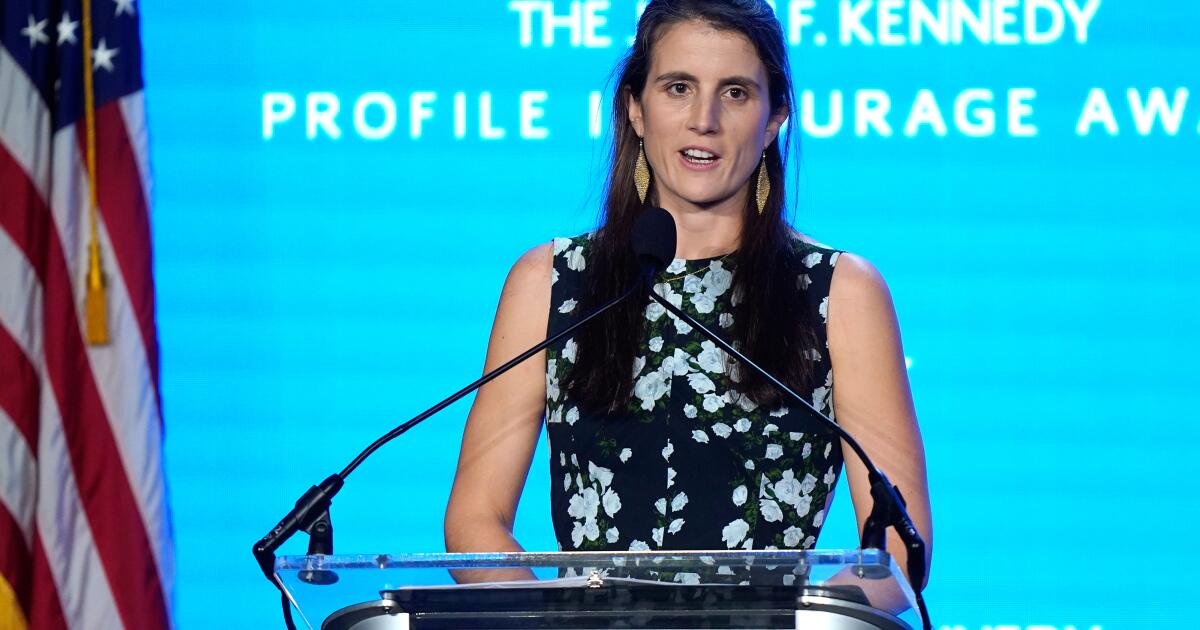Tatiana Schlossberg reveals terminal cancer diagnosis, another Kennedy family tragedy
Tatiana Schlossberg, granddaughter of slain President John F. Kennedy, is battling a rare form of leukemia and may have less than a year to live.
In an essay published Saturday in the New Yorker, the 35-year-old environmental journalist wrote her illness was discovered in May 2024 after she gave birth to her daughter. She was diagnosed with acute myeloid leukemia with a rare mutation known as Inversion 3 and has undergone several treatments, including chemotherapy and bone marrow transplants.
Schlossberg is a daughter of former U.S. Ambassador Caroline Kennedy, the former president’s daughter, and Edwin Schlossberg. They live in New York.
In her essay, Schlossberg acknowledged that her terminal illness adds to a string of tragedies that has befallen the famous political family. Her grandfather was assassinated in Dallas in 1963. Nearly five years later, his brother, Sen. Robert F. Kennedy, was fatally shot in Los Angeles after giving a victory speech at the Ambassador Hotel following his California presidential primary win. Her uncle, John F. Kennedy Jr., died in 1999 when his small plane crashed.
“For my whole life, I have tried to be good, to be a good student and a good sister and a good daughter, and to protect my mother and never make her upset or angry,” Schlossberg wrote.
“Now I have added a new tragedy to her life, to our family’s life, and there’s nothing I can do to stop it.”
She wrote her diagnosis was stunning. She had just turned 34, didn’t feel sick and was physically active, including swimming a mile one day before she gave birth to her second child at Columbia-Presbyterian hospital in New York.
After the delivery, her doctor became alarmed by her high white blood cell count.
At first, medical professionals figured the test result might be tied to her pregnancy. However, doctors soon concluded she had myeloid leukemia, a condition mostly observed in older patients. She ended up spending weeks in the hospital.
“Every doctor I saw asked me if I had spent a lot of time at Ground Zero, given how common blood cancers are among first responders,” Schlossberg wrote. “I was in New York on 9/11, in the sixth grade, but I didn’t visit the site until years later.”
She has endured various treatments. Her older sister, Rose, was one of her bone marrow donors.
In the article, Schlossberg mentioned the Kennedy family’s dilemma over controversial positions taken by Robert F. Kennedy Jr., her mother’s cousin. Schlossberg wrote that while she was in the hospital in mid-2024, Kennedy suspended his long-shot campaign for president to throw his weight behind then-Republican candidate President Trump.
Trump went on to name Kennedy to his Cabinet as secretary of the U.S. Dept. of Health and Human Services, which oversees the Food and Drug Administration, National Institutes of Health and the Centers for Disease Control and Prevention.
In one of his early moves, Trump demanded a cut in government money to Columbia University, which employs her husband, George Moran.
“Doctors and scientists at Columbia, including George, didn’t know if they would be able to continue their research, or even have jobs,” she wrote. “Suddenly, the health-care system on which I relied felt strained, shaky.”
On Saturday, her brother Jack Schlossberg, who recently announced his bid for Congress in a New York district, shared on Instagram a link to her New Yorker essay, “A Battle with My Blood.”
He added: “Life is short — let it rip.”
